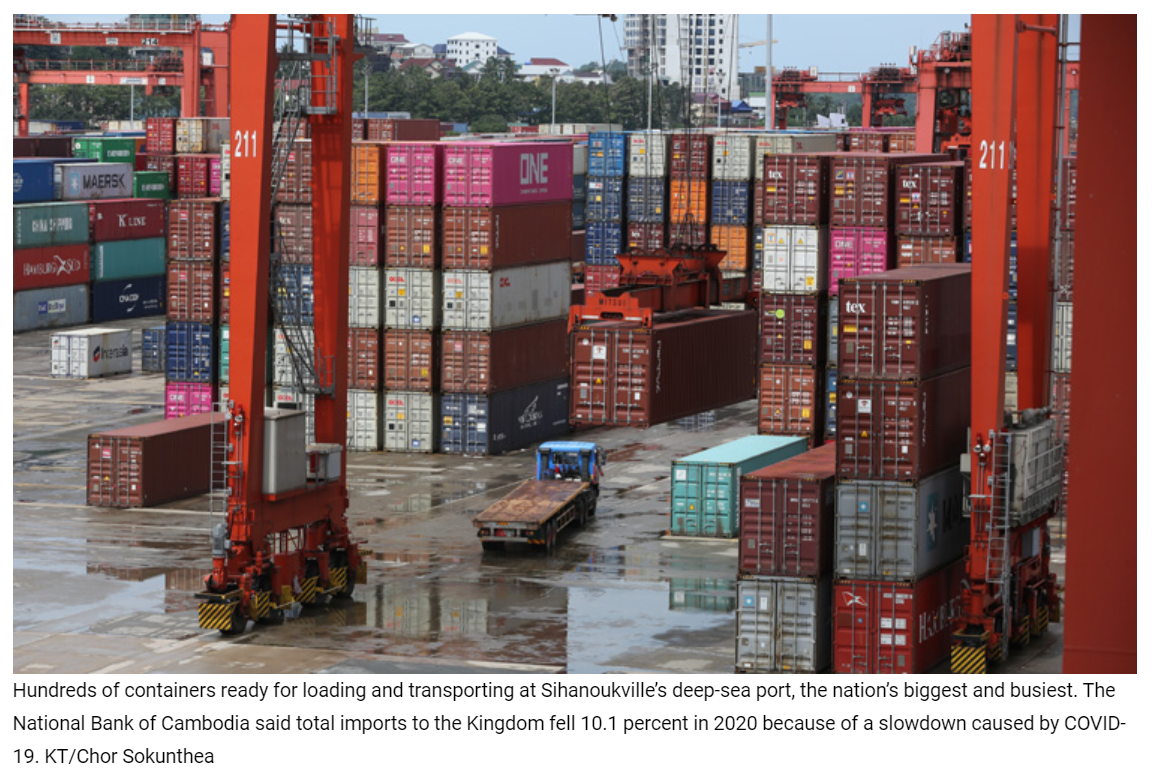Cambodia: Payments balance up Kingdom sees a 1.7 percent surplus in 2020
The Kingdom’s balance of payments (BOP) saw a 1.7 percent surplus compared with its gross domestic product (GDP) in 2020 with growth supported by the in-flow of foreign direct investments and exports, according to a report from the National Bank of Cambodia (NBC).
The NBC added the current account was estimated to suffer a deficit of 7.6 percent of GDP in 2020. It was 15 percent in 2019 compared with GDP because of the decrease of the trade deficit in commodities.
It said total exports had increased 15.9 percent in 2020 because of a rise in exported gold, electronics, bikes, milled rice and rubber. However, exports of garment products dropped around 7.8 percent.
The NBC report showed total imports to Cambodia fell 10.1 percent in 2020. They were up 18.3 percent in 2019 compared with 2018. The decrease was because of the slowdown of imported raw materials used in the garment, footwear , construction materials, automotives and fuel sectors.
The report said 2020’s foreign direct investment in the Kingdom dropped 11.9 percent in 2020 mainly due to a decrease of investment in the banking sector (down 14.2 percent) and the non-banking financial sector (down 9.8 percent).
It noted that major export market segmentation for Cambodia in 2020 was 30 percent to the US, 14 percent to Singapore, 6.2 percent to China, 6 percent to Japan and 5.5 percent to Germany. Cambodian imports broke down as 36 percent from China, 15 percent from Thailand, 14 percent from Vietnam, 5 percent from Singapore and 3.5 percent from Switzerland, with the remainder made up of mports from other nations.
It also said the surplus in the Kingdom’s balance of payments boosted its international reserves to $21.3 billion, sufficient to guarantee 10 months of goods and services imports. This amount exceeds the three-month minimum requirement for developing countries.
The NBC also stated that the level of international reserves on hand enables Cambodia to manage its exchange rate, stabilise the financial sector, increase national properties and build trust among the public.
Hiroshi Uematsu, chief executive officer of the Phnom Penh Special Economic Zone (PPSEZ), said last week the total value of all exports from the zone for 2020 was $611 million, up around 18 percent compared with 2019. Those exports mostly consisted of automobile parts, cosmetics, clothes, diamonds, electric and electronic parts, shoes and solar panels.

He also said that withCambodia being able to contain COVID-19 better than other countries, some companies have decided to increase production in Cambodia. Another reason for the growth in 2020 exports is the zone has accommodated a variety of industries, providing a diversity of products including gaming device parts, do-it-yourself products and automobile parts, all of which have enjoyed increases in demand because of “stay home” and “social distancing” policies abroad.
“This year will depend on how well COVID-19 is contained. We assume it will be hard to get new investors, but we have been lucky that some of our tenants’ factories are planning for expansion. We will fully support their plans,” Uematsu said.
He added: “At the same time, we will keep increasing recurring income from utility, security, construction, accounting services and other sources.
Source: https://www.khmertimeskh.com/50807074/payments-balance-up-kingdom-sees-a-1-7-percent-surplus-in-2020/


 Thailand
Thailand




